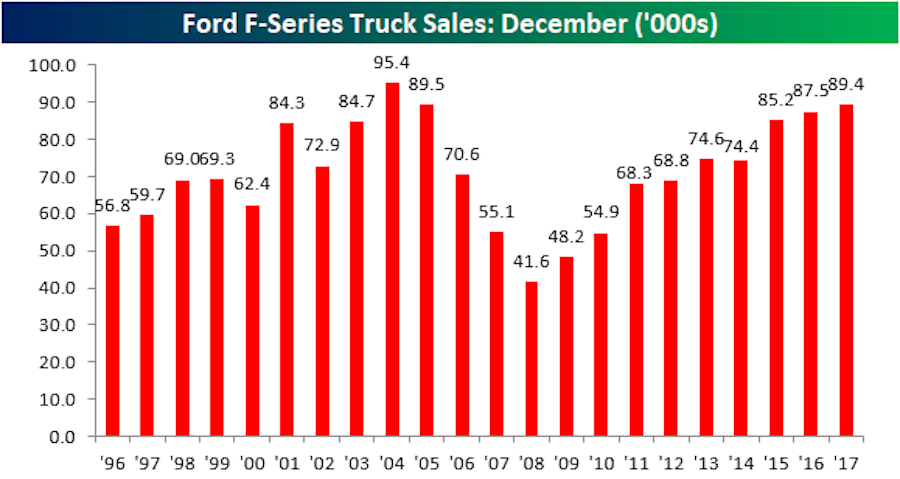Auto sales declined in 2017 for the first time since the financial crisis
After a record year in 2016, sales for the U.S. auto industry pulled back just a bit in 2017.
And for the first time since the financial crisis, sales of cars in the U.S. declined from the prior year in 2017, totaling 17.2 million after hitting 17.85 million cars and light trucks in 2016, according to Autodata. Still, this was one of the strongest years ever for the auto industry.
“2017 vehicle sales finished strong as a resurgent US economy lifted the market to its fourth-best-year ever,” said Charlie Chesbrough, senior economist at Cox Automotive.
“Record highs in the stock market, coupled with continued declines in unemployment have raised consumers’ confidence which has resulted in better than expected sales in December. However, 2018 may be a more difficult year as headwinds grow for the vehicle market.”
While economic growth is expected to continue in 2018, higher interest rates could pressure auto sales, with longer-lasting vehicles and several years of robust sales since the financial crisis also potentially weighing on growth in the space this year.
In December, sales were something of a mixed bag with General Motors (GM), Ford (F), and Fiat Chrysler (FCAU) posting better-than-expected numbers, though only Ford posted an increase in sales against last year. Ford’s sales rose 0.9% in December. General Motors, Fiat Chrysler, as well as Japanese giants Toyota, Honda, and Nissan, each posted sales declines in December.

Earnings for the major U.S. automakers, however, have been solid with Ford and Fiat Chrysler each reporting an earnings beat in their most recent quarterly reports. General Motors reported a nearly $3 billion loss due to the sale of a unit in Europe; excluding this, results topped expectations.
So despite a year-on-year slide, it is still a good time to be in auto industry. And this is due in part to the mix of vehicles that consumers are preferring, or what Karl Brauer, executive editor at Autotrader and Kelley Blue Book, calls the “death of the car.”
“The real story in 2017 was the near wholesale death of the car,” said Brauer.
“At Ford, for instance, every car model was down in 2017. That was also true for Buick, Chevrolet, Chrysler and Dodge…Of Toyota’s 13 car models, 11 were down in 2017. Of Nissan’s 10 car offerings, seven were negative. Five of VW’s six car models were also down, and a similar story carried across nearly every luxury brand.”
Brauer added that, “this is a paradigm shift in consumer behavior, and the fallout will be reflected over the next few years as automakers make hard choices regarding which model lines will live or die. The good news is truck and SUVs sales pretty much counter-balanced the drop in cars, and those models are almost always more profitable for automakers.”
Bespoke Investment Group noted on Wednesday that Ford’s F-150 truck had its best December sales since 2005 and third-best since 1996.

The firm adds that in addition to the margin benefits Ford enjoys from selling trucks over smaller, cheaper cars, this also points to a strong small business sector as small businesses and contractors are large buyers of the truck. Overall, 2017 was the F-150’s best year since 2005.
A strong economy, improving fuel economy across models, and years of relatively low oil prices have made larger cars more attractive. Even with plateauing sales, then, it’s still a good time to be in the car business.
—
Myles Udland is a writer at Yahoo Finance. Follow him on Twitter @MylesUdland
Read more from Myles here:
